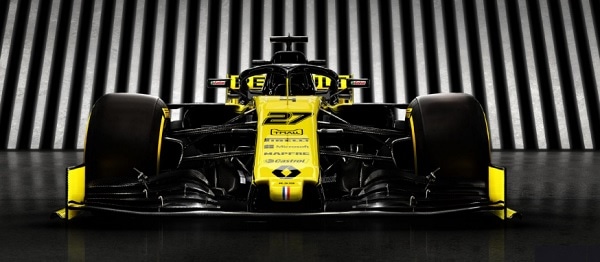Jabil has announced an additive manufacturing agreement with Renault F1 Team to speed the development and delivery of 3D-printed racecar parts for the Renault R.S.19, competing in the 2019 Formula One World Championship. Through the Jabil Additive Manufacturing Network, Renault F1 Team will gain fast and efficient access to top-quality parts.
On-Demand Delivery of Racecar Parts for Renault F1 Team

“We’re excited to be part of Renault F1 Team’s strategy to improve performance with additive manufacturing,” said John Dulchinos, VP of digital manufacturing, Jabil. “Our ability to consolidate a global supply chain and scale qualified processes as needed will enable the production of chassis and on-car components in record time.”
Certified Jabil 3D Printing Facilities
An early adopter of additive manufacturing, Renault F1 Team continually seeks opportunities to produce racecar parts quickly and economically while reducing vehicle weight and without compromising part strength or integrity. “Every single aspect of what we do is geared towards excellence. We look forward to taking advantage of Jabil’s growing ecosystem of certified materials, processes and machines to boost parts availability and overall productivity,” said Antoine Magnan, Head of Partnerships, Renault Sport Racing.
Propelling 3D Printing Innovation with Facilities Expansion
Recent expansions to the Jabil Additive Manufacturing Network are designed to address the 3D printing needs of highly regulated industries. Additional 3D printing capacity has been added to Jabil’s Detroit-area manufacturing facility in Auburn Hills to support expanding automotive and healthcare applications. The facility, which is ISO 13485 certified, offers customers access to world-class machines for high-speed sintering, selective laser sintering and fused filament fabrication.
At Jabil’s AS9100 certified facility in Seattle, aerospace and defense customers will benefit from the company’s manufacturing rigor, supply chain orchestration and strict quality control processes. Jabil now has more than 200 3D printers at state-of-the-art facilities connected to the Jabil Additive Manufacturing Network, spanning sites in the United States, China, Hungary, Mexico, Singapore and Spain.
Expanded additive manufacturing capabilities are complemented by Jabil Engineered Materials, which are custom polymer formulations and compounds produced according to ISO 9001 Quality Management System standards. As part of its open-systems approach, Jabil works with the most advanced 3D printers, from industry leaders including Desktop Metal, EOS, Farsoon, HP and Ultimaker.
“Emerging End-to-End Applications for Additive Manufacturing”— Dulchinos addressesd a new generation of applications that encompass the best Materials, Processes and Machines (MPM) to speed 3D printing adoption. Key business drivers for maximizing 3DP value will be examined, encompassing Design for Additive Manufacturing (DfAM), process development, customized materials, prototyping, manufacturing, post-processing, quality control and distribution.